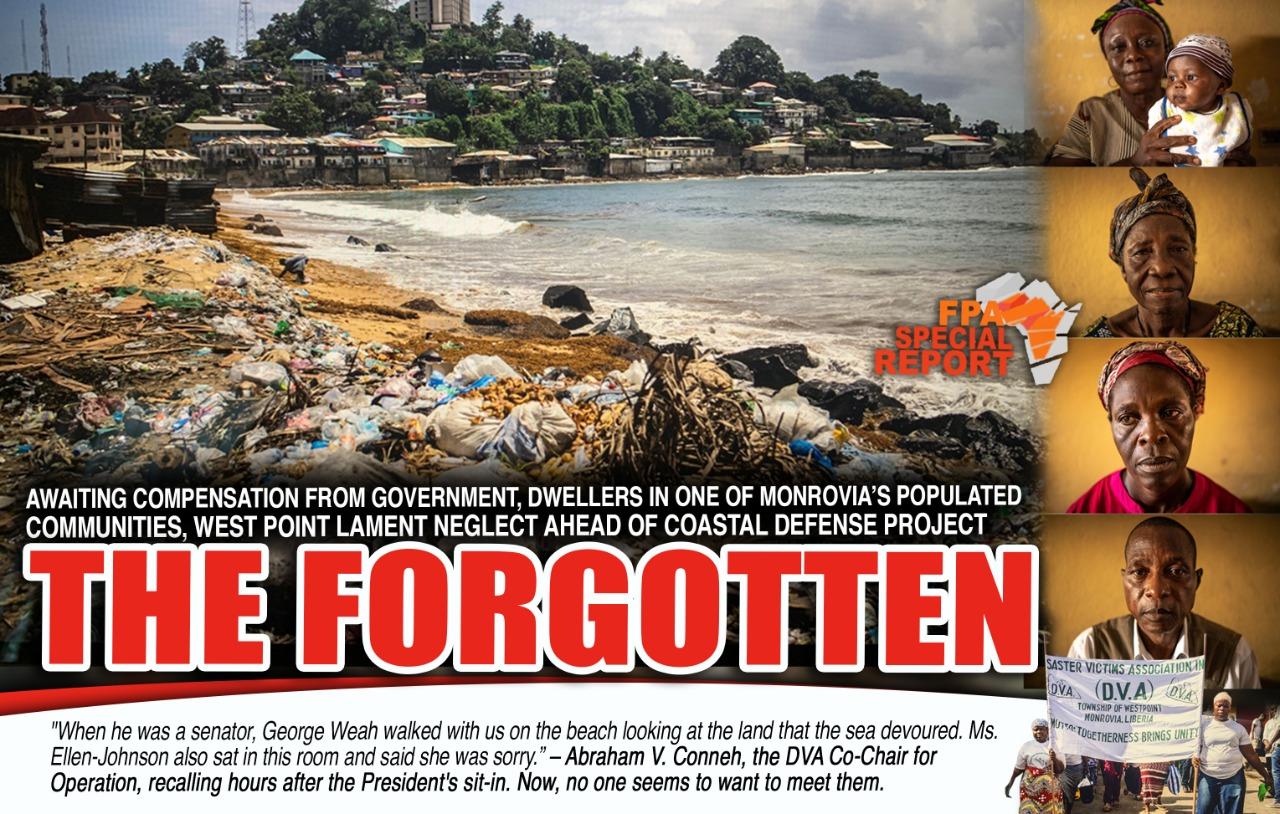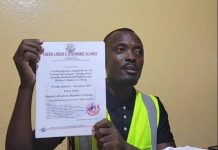
Africa-Press – Liberia. Dwellers of West Point were stood up by the President in the launching of the coastal defense project that will protect Monrovia’s largest slum. Among the residents who waited three hours there were victims of the sea erosion who have not received the compensation promised by the administration. The recent event only begins the studies of a construction that will start not before October 2022 and will take, at least, five years to complete.
Every time she returns to the beach, Comfort Nyenetue’s eyes stop at the doorframe that saw her grow up. The house her mother built 30 years ago is now in ruins and surrounded by rubbish. Just a few metres of sand littered with plastic and children defecating separate her from a sea that stole all her memories. Since September 2020 she has been a homeless woman. “I was sleeping when the water came through the wall and broke the bricks. I remember grabbing my grandchildren and running to the school. I was so scared,” says.
She recalls that night wandering through the small corridors of West Point Township. She wants to show the door of the school where she slept more than 370 days. Now, she has been asked to leave before November 1st reopening. Jannet Toh, another victim of the waves, walks with her side by side.
According to the documentation seen by FPA, Toh is No.29 (out of 45) on the list of family heads who have not received the promised mattress, the 25-kilo bag of rice, and 230 USD. These lack of management affects people like Amara Sheriff who has been living in his car the last four months. Or doctor S. Pantoe Swen who lost his house and clinic. Or Musu Boiphie who has been sleeping in the mosque for a year. On the list doesn’t appear the youngest of all the 4,081 individuals that the Disaster Victims Association (DVA) represents. Gebert Rogert is barely four months old and his mother died giving birth to him. Now, he lives with his grandmother, Jatu Sando, who also lost her home in 2014.
On July 29, the NGO sent all the names and phone numbers to the Township Commissioner, but they are still waiting for a solution. Nowadays, more than 700 people they represent are homeless. And, although the administration of former president Ellen-Johnson Sirleaf started the construction of houses in Brewerville to relocate some of them, the change in power stopped the initiative.
This Monday, hundreds of people went to the launching of the Coastal Resilient Project that will protect the peninsula. The event only announced the beginning of the studies, since the construction will start, at the earliest, at the end of 2022 and will last at least 5 years. A reality discovered by the victims during the act. Some of them, like 68-year-old Aminata Yakineh, will never see the wall. She died last week.
The DVA representatives, with a white and green banner, listened for three hours to the Commissioner, the UNDP representative, several ministers and the district representative, among others. But not to George Weah, as they were promised. According to a social media video, the president was that day in his Jamaica resort to honor the 19-year-old who returned a bag with 50K USD.
“We are disappointed. He is a man from the slum, we know him, but he never appears. His honorable presence would have comforted the families,” Daniel S. Grant, Chairman of DVA, said.
On the street, the feeling was similar. M., who asked not to give his full name out of fear, recounts that he has voted for the former footballer in every election since 2005, but will no longer do so. “This is the third time he’s said he’s coming and he doesn’t show up. When Ellen-Johnson came we threw stones, but she came back. Then she brought us electricity… Although we put him there, George Weah has forgotten us.”
Money And Lies
Weeks ago, William C. Wea, the Commissioner of the Township, denied the victims’ claims at his office. “There are credible statistics that people received the money. Everyone received,” reaffirmed after seconds of silence.
The reproduction of his words disrupts the atmosphere at the DVA headquarters and brings to light e-mails of the organization to the Commissioner sharing the list of people that did not received the compensation. No.36, Mercy Brown, frowns while she listens to Mr. C. Wea words. “¡That’s a lie! There are many of us, especially women, that have not even been paid a cup of rice,” assures.
“They talk and talk and talk, but nobody thinks of the victims. If they came here and saw how people live they would feel sorry. There are many who have nothing, there are 48 children without education because the parents can’t afford the school fees and you have to see them on the streets!”, interrupts Abraham V. Conneh, Co-Chair for Operation of DVA.
Similar stories can be heard around the Township. Sometimes they are mothers selling small bags of water, sometimes grandmothers begging on the streets, but for the vast majority, the daily profit rarely exceeds 150 LRD.
No Answer Given
On September 9, District 7 Representative Solomon C. George sent a letter to the President on behalf of the victims. Now, DVA leaders want to give another one to Finda Bondoo, Chief of Protocol, to try to meet with George Weah.
The letter is signed by Daniel S. Grant (Chairman) and S. Pantoe Swen (Secretary General) of the NGO and says: “The leadership of the Disaster Victims Association Inc. (DVA) of the Township of West Point is seeking and audience with you at your time of convenience to discuss pertinent issues regarding the plight of the Victims. We will be very grateful if our request meets your very favorable and timely consideration”.
Their patience can only be explained by the fact that they feel that perhaps the people around the President has not been forthcoming with information on this matter. However, not all victims are so patient and some are considering organizing protests in official buildings.
Who Is Responsible For?
To understand what is happening, it is necessary to follow the money. In words of the Commissioner of the Township, the president instructed the Ministry of Finance and Development Planning, so the money was forwarded to the account of the National Disaster Management Agency (NDMA) who was supposed to send the compensation through the Mobile Money System.
At the end of September, family heads who did not receive the aid, such as Mercy Brown or Jatu Sando, were able to explain their cases to two NDMA officials who went to West Point. The officials refused to answer this reporter’s questions. It is in this last step where the money seems to be lost. However, the Government is the one responsible for ensuring compliance with its orders, the same administration that has been ignoring the Disaster Victims Association since 2018.
“When he was a senator, George Weah walked with us on the beach looking at the land that the sea devoured. Ms. Ellen-Johnson also sat in this room and said she was sorry,” Abraham V. Conneh, the DVA Co-Chair for Operation, recalls hours after the president’s sit-in. Now, no one seems to want to meet them.
The day ends at West Point and the sun goes down. The fishermen have a few hours left to get back to sea and the street sellers return to their homes. But not everyone here is so lucky. Mama Swakay will sleep with her ten grandchildren in a shop they borrow her for the night. Hawa Kromah will go to the mosque with her nine children and four grandchildren. Christina Dapay will walk to the church with her three sets of twins. Theresa Partie will lie down on the porch facilitated by a friend not to get wet from the rain.
These, and hundreds more, are runway stories due to the lack of planning. Biographies marked by an ocean that has already swallowed nearly a thousand houses. People condemned every year to become the first line of defense of Monrovia’s largest slum. Poor, displaced, lied and forgotten by the Government.
For More News And Analysis About Liberia Follow Africa-Press





